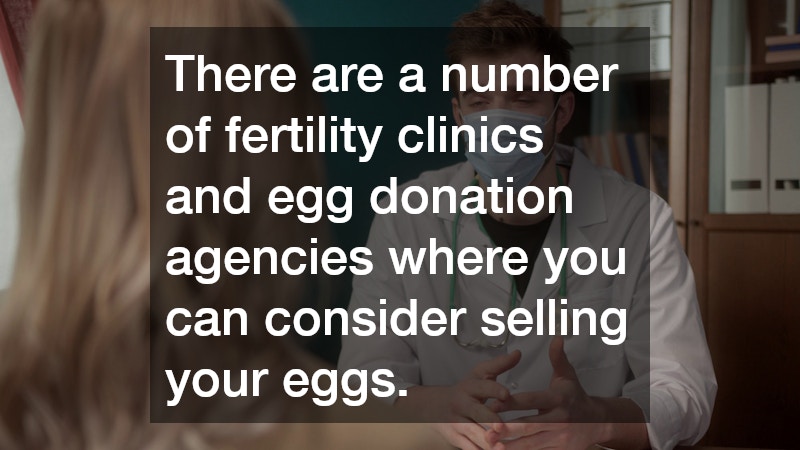Egg donation is a generous act where a woman donates her eggs to help another individual or couple in their journey to parenthood. This process has been gaining popularity in recent years as more people become aware of infertility issues and the various ways to address them. Women interested in donating their eggs often wonder, ” Where to sell my eggs?” and it is crucial to ensure this process is safe and ethical. Egg donation not only offers financial compensation but also personal satisfaction from helping others achieve their dream of having a child.
It’s essential to approach this topic with care, as both physical and psychological aspects are involved.
There are a number of fertility clinics and egg donation agencies where you can consider selling your eggs. Such organizations are responsible for ensuring all parties are informed and protected throughout the donation process. Each of these establishments has specific criteria and policies for donors, which potential donors need to be aware of and thoroughly understand before beginning the process. The key is to conduct thorough research on the various agencies and clinics to make an informed decision that aligns with your values and needs. It’s of utmost importance to choose a reputable place to ensure both safety and fair treatment.
The safety of the egg donation process is often a primary concern for potential donors. It’s essential to highlight that while donating eggs can be safe, it is not without risks. Thorough medical screenings, psychological evaluations, and a clear understanding of what the process involves are critical to ensuring donor safety. Moreover, understanding the legal ramifications and ensuring there’s legal protection are important steps before proceeding. Overall, the right clinic or agency plays a significant role in minimizing any potential risks associated with egg donation.
How the Donation Process Works
The egg donation process begins with an application and an initial medical screening to determine eligibility. This typically involves a range of medical tests to ensure the donor is healthy and does not have any genetic disorders. Psychological evaluations are also part of the screening to ensure the donor is mentally prepared for the process. Once approved, donors are matched with recipients based on a range of criteria, ensuring a good fit for all involved. It’s vital that donors diligently follow every step in the preparatory process to ensure their well-being and the success of the donation.
Once matched with a recipient, donors undergo a hormone treatment protocol to stimulate egg production in the ovaries. This stage can last for several weeks, during which donors require careful monitoring by medical professionals to avoid complications such as Ovarian Hyperstimulation Syndrome (OHSS). Regular visits to the clinic ensure that hormone levels are monitored, and the donor’s health is consistently assessed. The collection phase involves a minor surgical procedure under sedation to retrieve the eggs. The most important aspect during this phase is the professional care provided to donors to ensure their safety and comfort.
After the eggs are collected, there is a short recovery period. Clinics typically provide post-procedure care and observation to ensure there are no immediate complications. The financial compensation process is also conducted shortly after the procedure. Supporting donors both medically and emotionally at this stage is crucial for their overall well-being. Adequate post-procedure support and follow-up appointments help ensure the donor’s health is intact, marking the completion of the donation process.
Where to Sell My Eggs: Finding the Right Place
When deciding where to sell your eggs, it is imperative to choose a reputable clinic or agency. A good starting point is researching online reviews, getting recommendations from past donors, or consulting medical professionals. Well-established fertility clinics often have a consistent track record in the industry, providing security and peace of mind to donors. It’s essential to verify the credentials of the clinic’s medical staff to ensure competent and professional care throughout the donation process. Overall, the right establishment should make potential donors feel assured about their decision to donate.
Working with an agency can be another option for those looking to donate eggs. Agencies act as intermediaries connecting donors with recipients, often having more flexible policies than clinics. They provide a range of services, including matching donors with recipients, managing the logistics of donation, and ensuring compliance with legal requirements. It is crucial to check that the agency is licensed and that it follows ethical guidelines devoted to protecting both donors and recipients. The supportive framework an agency provides can often streamline the donation process for those involved.
Is Selling My Eggs Safe?
Ensuring safety during egg donation involves several steps, and choosing the right establishment plays a significant role. Potential risks include reactions to hormone treatments, surgical complications, or psychological impacts. However, reputable clinics and agencies have protocols in place to minimize these risks significantly. Receiving comprehensive pre-donation counseling and education helps donors understand the potential risks and empowers them to handle the process confidently. Ensuring one’s health and safety should always be prioritized when considering egg donation.
A key safety measure involves thorough medical screening before proceeding with the egg donation process. This screening assesses the physical health of potential donors to rule out any underlying conditions that may pose risks. Regular monitoring and support by healthcare professionals helps mitigate potential adverse effects during hormone treatment and the retrieval procedure. Consistent medical assistance ensures that any arising issues are addressed promptly.

